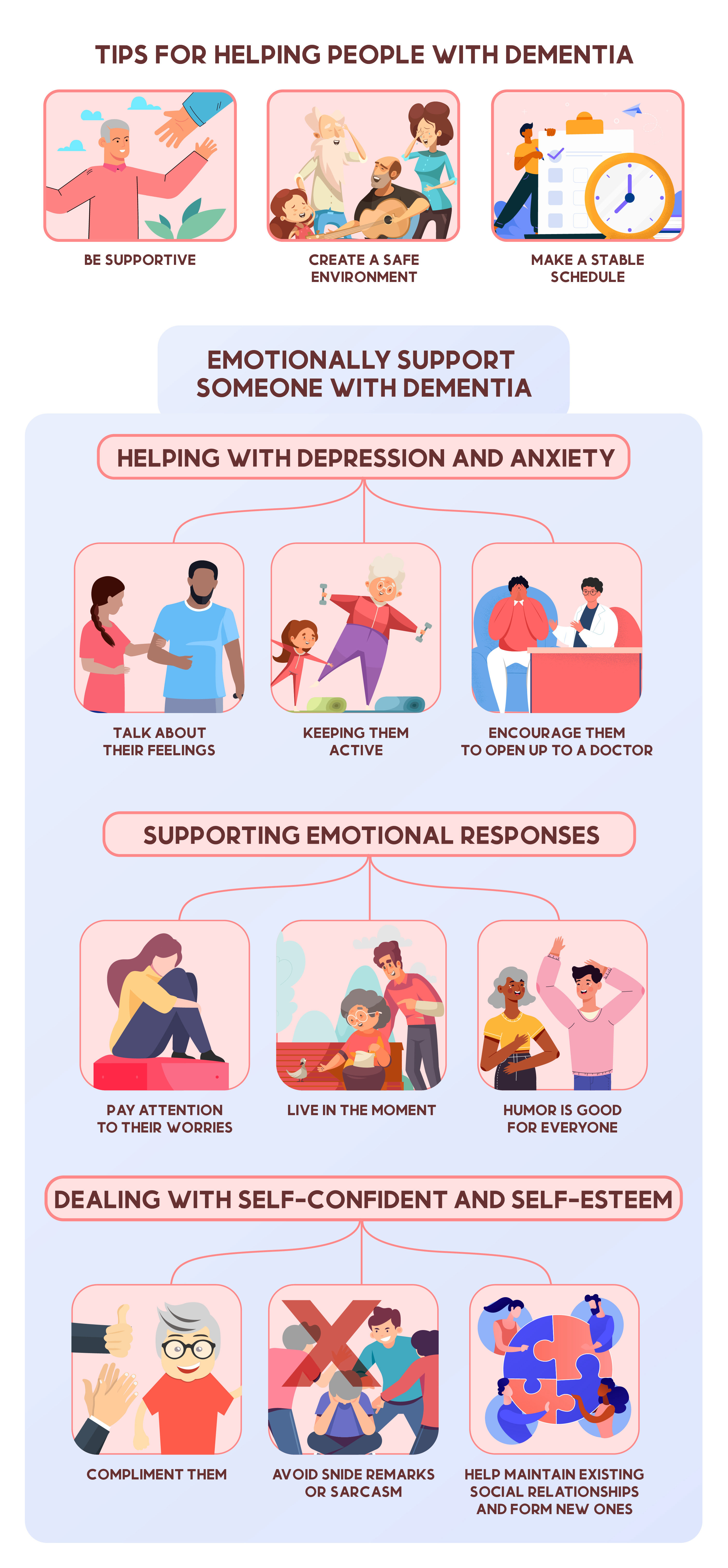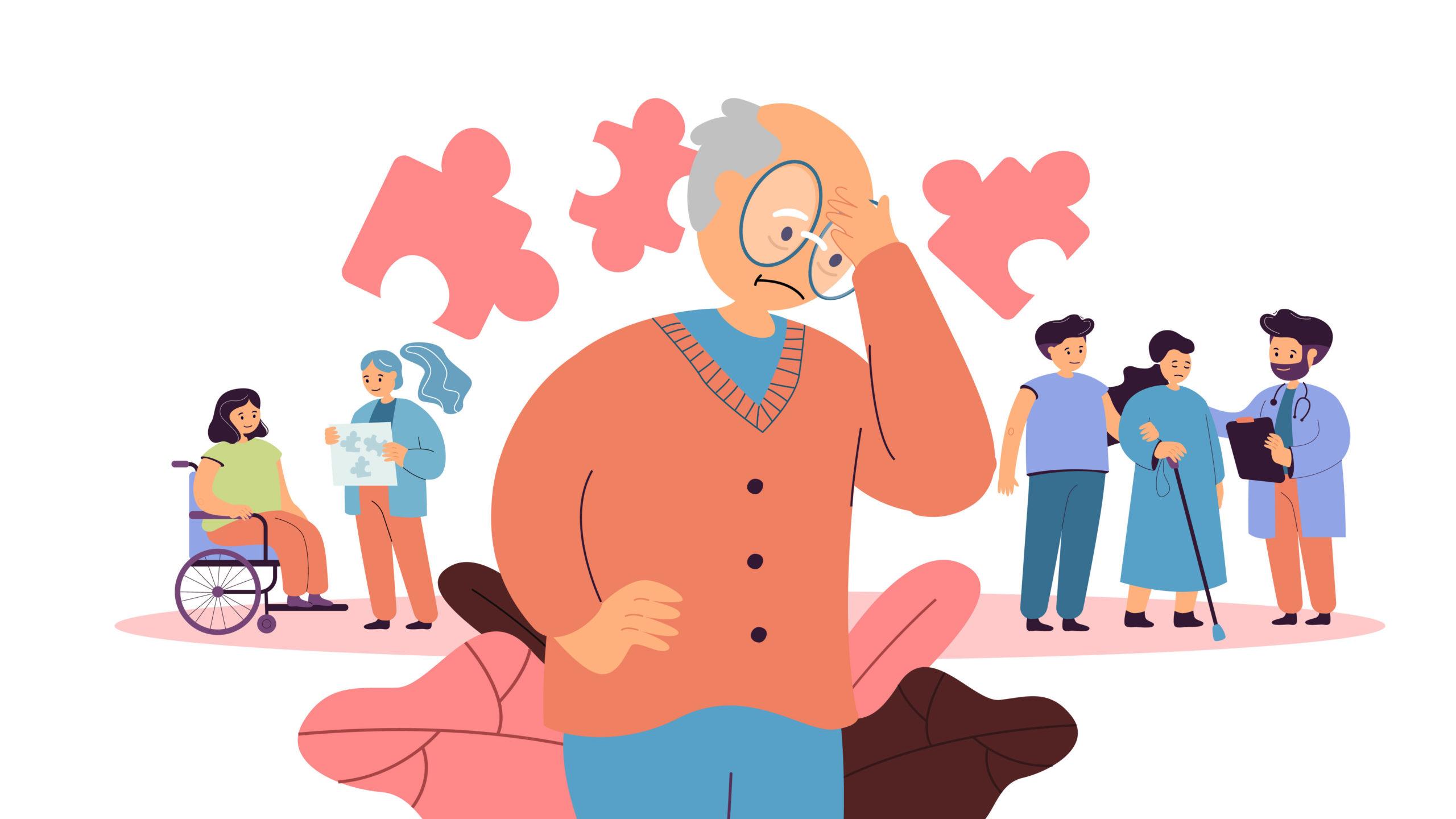Introduction
According to alz.org, dementia is the general term used for the loss of cognitive ability. This includes memory, language, problem-solving, and other thinking abilities. Seniors who have dementia find it hard to carry on with their lives due to these limitations. So, it is your duty to support a person with dementia.
Dementia can be a challenging condition for both the person affected and their caregivers. However, with supportive care, it is possible to maintain a good quality of life for the person with dementia and provide them with the assistance they need. Supportive care includes providing a safe environment, assistance with activities of daily living, and social and recreational activities.
To make things easier for you, we have developed a guide that can be used to find out how to help someone with dementia. Because there’s a lack of information, we still don’t know much about this disease.
So, without further delay, let’s begin!
Dementia and Family Support
A patient’s dementia support system consists of family members and friends. These people can help them as they go through this condition. But, it’s a lifelong commitment. After all, there has been no cure for dementia so far, so there’s little that can be done to cure someone completely.
In fact, the NHS has a very informative article about the “cure” of dementia. But, since many reasons are leading to dementia, it is likely that there will never be a single cure for it. After all, a whole host of diseases lead to the development of dementia.
There are just way too many factors at play here. Every person experiences dementia differently. So, even if your loved one is looking for dementia support, you need to be mentally prepared for what the future holds.
Dementia will stay with the affected party for the rest of their life. So, you must do whatever you can to ensure that you’re the best dementia support system for your loved ones.
Of course, everyone around a dementia patient wants to help. There’s no doubt about that. But caring for someone with dementia can be tricky itself. So, it is essential that you try to maintain a semblance of normality. And continue helping them battle this condition daily.
You don’t want to stifle someone with dementia. That’s not what is going to help them at all. What you need to do instead is help them get better- even as their condition worsens.
What Are the Three Tips for Helping People with Dementia?
When people find out that a loved one has dementia, they ask if there are any “tips” available to make their life simpler. Of course, there’s plenty that can be done to support someone with dementia. But if you’re wondering what the first few steps are, then we’ve got the perfect tips for you!
1. Be Supportive
You may think that this is the most obvious suggestion to support someone with dementia. But did you know how particular you need to be? A patient recently diagnoses with dementia will be feeling many things.
The first one is disbelief. How could they have dementia? How could they allow something like this to happen? Does this mean that they won’t be able to carry on with their life? Will they need help doing everything?
These are some of the questions that newly diagnosed dementia patients often ask. They’re often overwhelmed with all these anxious thoughts. So, as a trustable dementia support system, it is your job to help them through this.
So, you need to make sure that you’re always at you’re a-game when you’re dealing with someone with dementia. You can’t slip up. We can’t tell you how big of an issue slipping up will be for a dementia patient’s caregiver. One wrong comment, one wrong look- and you can convince your loved one that they’re a burden on everyone. You don’t want that. It can undo months of hard work and progress.
You must ensure that everything is going perfectly. We understand that it’s a very emotionally taxing job, but it’s all part of the job. So, we caution you to think very, very carefully before you decide to take on an active role in a dementia patient’s life. If you have thought it through, heed this caution well.
2. Create a Safe Environment
The first thing you need to do is create a safe space. It is crucial that you ensure that the space is ideal for a dementia patient. Research has shown that dementia patients respond well to certain colors, lighting and sounds.
By ensuring that the sound and lighting of the immediate surrounding aren’t harsh, you can help them feel at ease. This is very important. Neutral colors, soft sounds and relevant noise will help them retain memory. Thus, help them stay stable in the long run.
As you can expect, this will need you to keep a check on yourself and others around you so that there’s no divergence. The dementia patient must develop a sort of muscle memory. This is essential for remembering the purpose of every room in the house. This is because there will come a time when they will no longer be able to do this themselves and will need support.
Muscle memory can be beneficial, as it will allow them to feel a bit more in control as time goes on.
3. Make a Stable Schedule
Besides a safe space, you must ensure that they follow the same schedule and maintain a stable lifestyle. You need to ensure that everything is perfect for your loved one.
As we pointed out in the last point, it is very important that you maintain a routine of sorts. This way, it is easier for the patient to get by once the disease progresses. And it will progress. Even if it is years or decades down the line, dementia patients will eventually find themselves succumbing to the disease. And the best way to support them then is to ensure that they’re doing well now.
You can do this by ensuring that even if they forget certain things, their body doesn’t. This includes waking up at a specific time, sleeping at a certain and so on. As someone’s dementia support system, it is vital to ensure that everyone helps create a stable schedule for the patient.

How Do You Emotionally Support Someone with Dementia?
One way to offer support for dementia patients is to be there emotionally. This is the most important part of the process, of course. Dementia patients often feel as though they can’t express themselves adequately.
There seems to be a disconnect when it comes to expressing emotions, which can cause quite a bit of stress. So, as the dementia support, you can help them by being there through a range of different emotions.
Let’s get started on those.
1. Helping with Depression and Anxiety
It is not unusual to see those with dementia developing depression and anxiety. So, what can you do to help someone like that? Well, we’ve got some suggestions!
-
- Talk about their feelings. This might sound pretty straightforward. But one of the biggest mistakes those with dementia make is not talking to anyone about how they feel. So, it’s your job to make sure that they talk. A simple “cheer up” will do. And believe it or not, maybe starting the conversation yourself can make a world of difference.
-
- Keeping them active. Physical exercise is excellent to help relieve feelings of stress and anxiety. So if you can help them work out or perhaps exercise with them, then that’s great. Exercising helps release dopamine which makes you feel happy. And this can make life so much easier for dementia patients.
-
- Encourage them to open up to a doctor. It is necessary that you talk to a doctor about the dementia patient’s depression or anxiety. These two tend to develop and progress faster in dementia patients compared to others. Even though your loved one might not want to talk to a doctor, it’s a wise decision too, and only you can encourage them.
2. Supporting Emotional Responses
It is reasonable for a person suffering from dementia to feel as though their emotions are all over the place. This may make it harder for them to process their emotional responses properly. You can help in this situation with the help of the following tips:
-
- Pay attention to their worries. No one stresses over for no reason. The same can be said for your loved ones as they are battling dementia. In this situation, they must allow themselves to express themselves by talking with them. Understand why they’re reacting a certain and why certain things are troubling them.
-
- Live in the moment. Everything can seem gloomy and serious after a loved one has been diagnosed with dementia. But this doesn’t have to be the case. Just because things might be worse tomorrow doesn’t mean that you have to be stern today. Make them understand this and organize activities that will allow the patients to enjoy the moment. It can help with the way they’re feeling.
-
- Humor is good for everyone. Make the home environment jovial and fun again. Everyone’s upset- we get it, and we’re sure that your family member gets it too. But, the best way to ensure that they can process their emotions well is when they can express them properly. Jokes, anecdotes…all of these things will help, of course.
3. Dealing with Self-Confident and Self-Esteem
Dementia may lead your loved ones to feel very insecure about themselves and what they can do. This can lead to insecurity and then depression and anxiety, which we have discussed above. So, what can you do to boost their self-confidence and self-esteem? Well, there are quite a few things you can do.
-
- Compliment them. It might seem a bit weird because you probably do give out compliments to your loved one, but you must be frequent. Meet them whenever they doubt themselves. Or visit them before the diagnosis. That’s a great time to compliment them for sure.
-
- Avoid snide remarks or sarcasm. It can be easy to forget that your loved one has dementia when you’re engaged in a heated conversation with them. But no matter what their opinion is, don’t be too harsh on them. Instead, gently explain your point without having to be rude. We often let loved ones get away with snide comments or remarks, but for a dementia patient, it’s not easy. So, we need to stop doing that, even if it’s just as a joke.
-
- Help maintain existing social relationships and form new ones. Most dementia patients struggle to maintain relationships. In fact, the loss of these relationships makes people upset as they feel that everyone’s leaving them. You can help your loved ones by ensuring that their relationships will remain intact.
What Are the Needs of a Person with Dementia?

People with dementia have specific needs which need to be met. This can be the Activities of Daily Living (ADLs). Or it can be Instrumental Activities of Daily Living (IADLs). It is important to ensure that the loved ones can fulfill these needs.
As the dementia support system, you can do quite a bit for your loved ones. You can help them feel supported, as though they aren’t being left behind. But you need to ensure that you know what you’re getting into.
As time will go by, so will the needs of the person suffering from dementia increase. Thus, you will need to be prepared for when they need help from doctors and nurses when the time comes.
So, for the time being, the best that you can do is ensure that your loved ones are aware of what they’re doing. To prolong this time of awareness, you can turn to specific foods for them to eat, which will help elongate their memory and health. You can also check out this article on ADLs or foods to beat dementia to learn more. We’ve also got a detailed blog post on dementia home care.
Just remember- you’re doing the best you can, and in this instance, there is nothing you can do but be supportive. Enjoy the time you have left with your loved ones, as this is truly what matters in the end.
Conclusion
In the end, we’d like to say that yes, we know. There is a lot that goes into caring for dementia patients, but you probably knew that. How dementia kills or how difficult it is – we all know that. But given how there’s no cure, there really isn’t anything that anyone can do about it.
So, the best way to ensure that your loved ones are happy and well taken care of in the face of such a serious disease is by making things better for them. And what better way could that be than by supporting them through dementia?
Stay calm and make sure that you’re doing everything you can to support the patient. But, during all of this, you must also ensure that you’re taking care of yourself. Your own mental health is also very important in such a situation. So, we recommend that you take care of yourself as well.
A dementia patient must have a host of people making up their support system. While you can be one of them, please make sure that the work is split in half. Everyone needs to take this seriously to help. There’s no room for error because any wrongdoing can negatively impact the patient. So, be sure to have a detailed discussion about all these as you begin to create a dementia support plan for your loved one. Good luck!
Key Takeaways
-
- Talking, motivating and humoring our seniors are excellent ways to support them emotionally.
-
- One of the best ways to deal with dementia patients is making them feel safe and stable.
-
- Finally, building a strong relationship that involves zero demeaning behavior is all what they expect from us.

